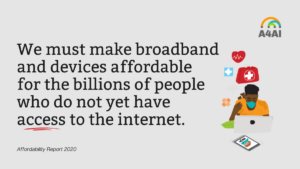Annually, the Alliance for Affordable Internet (A4AI) publishes a flagship Affordability Report that investigates the affordability of Internet access in low- and middle-income countries, based on a series of indicators relating to national performance in policy, connectivity, equality and equity. In a year defined by the digital transformation of the ways we learn, live and work, this year’s report looks at the state of policy progress to bring down the cost of Internet access and underlines the importance of effective national broadband plans in providing the conditions for Internet prices to decline. The Portulans Institute celebrates in particular the report’s warranted focus on data-based broadband planning and strategies, rooted in a holistic awareness of digital readiness as a result of consultation, clear targets and funding commitments. As a whole, the report offers a series of important conclusions and talking points about the state of global affordability.
Overall trends for affordability are encouraging and are a cause for optimism.
In recent years, there has been substantial headway in affordability worldwide. The report notes that since the foundation of the Affordability Drivers Index (ADI), mobile broadband has become more affordable, and ADI scores have improved across all three regions of interest (Africa, Latin America and the Caribbean, and the Asia-Pacific region), rising from an average of 42 in 2014 to 55.6 in 2020. In the past five years, the average cost of 1GB of data has declined by more than half (as a percent of average monthly income). And as a region, Africa’s policy advances are the most notable, with the year’s fastest regional improvement.
While improvements and innovations in digital tech are important, government policy commitments to meaningful connectivity are the key to affordability for all.
The countries ranking at the top of the 2020 ADI – Malaysia, Colombia and Costa Rica – are all celebrated for their excellent national broadband planning. For instance, Costa Rica’s National Broadband Plan wins global plaudits for its rigorous biannual evaluations to track progress and the highly consultative co-drafting behind its action plans. Programs like the Connected Homes Initiative actively combat economic inequality by providing households with the right tools for meaningful connectivity. Initiatives like these are bolstered by a recent Supreme Court ruling establishing a minimum Internet connection speed to be followed by all service providers. Costa Rica’s policy commitments to meaningful connectivity are bolstered by the country’s enviable track record in digital innovation and transformation.
Despite this progress, much headway is still required.
This year’s Affordability Report stresses that while overall trends are going in the right direction, “progress on reducing prices remains too slow”: this is a cause for concern in the age of Covid-19, as “Internet access is not a luxury but a lifeline.” Worryingly, around half of the world’s population is still not connected, and over a billion people covered by the survey do not meet the UN Broadband Commission’s affordability thresholds. Even in communities and countries with wide Internet access, digital inequalities in access speeds and content relevance persist. (Read the A4AI’s explanation of meaningful connectivity). A4AI’s analysis suggests that there remains a US$428 billion funding deficit for bringing down the cost of access for all.
Looking ahead: affordability is a strategic imperative in the post-Covid recovery period.
As emphasized by Boutheina Guermazi, Director of Digital Development at the World Bank, “Covid-19 exposed the digital divide between and within countries and, for nations lagging behind, now is really time to prioritize broadband deployment and connect the unconnected… We cannot afford not to leverage an instrument that can fast-track progress, especially in a context where Covid-19 is expected to push millions of people into extreme poverty and put at risk a decade of progress in terms of human capital.” In recent months, the Portulans Institute has published data-driven findings (such as the Network Readiness Index) and interview insights (from the Dialogue on Digital Transformation) about the state of global digital transformation as a result of the coronavirus pandemic. It is evident that a core and undeniable tenet of equitable, future-ready digital transformation is affordability for all. The Portulans Institute applauds the release of this report and looks forward to using its data for analysis and commentary.




